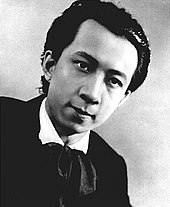Yuan Muzhi
Yuan Muzhi ( Chinese 袁 牧 之 , Pinyin Yuán Mùzhī , actually Yuan Jialai ; born March 3, 1909 in Ningbo , Zhejiang , † January 30, 1978 in Beijing ) was a Chinese actor, screenwriter and film director.
Yuan came into contact with the theater while he was still in school. As a college student, he played the lead role in Chekhov's Uncle Vanya . From 1930 worked in left theater groups. In 1934 he went to the left-wing activist film company Diantong, where he appeared in Ying Yunwei's film Taoli Jie (Plunder of Peach and Plum) , for which he had also written the screenplay. The film is socially critical and deals with the labor market conditions in China in the 1930s. Yuan Muzhi made his directorial debut in 1935 with Dushi fengguang (Cityscape) , a musical. Another important film by Yuans bei Diantong was Fengyun ernü (Sons and Daughters in a Time of Storm) (1935), in which he is one of the two singers in the film song March of the Volunteers , which later became the national anthem of the People's Republic of China .
After Diantong was closed to government intervention because of its left-wing orientation, Yuan found a job with Mingxing in 1936 . After another film as an actor, directed by Ying Yunwei, Yuan Muzhi created the classic Chinese film Malu tianshi (Street Angels) in 1937 ; he wrote the script and directed. Singer Zhou Xuan and Zhao Dan played the leading roles in what is now considered one of the best films by filmmakers of the "second generation" . During the Sino-Japanese War , Yuan Muzhi went to Yan'an with other filmmakers and continued his left-wing theater work.
In 1940 he became a member of the Communist Party . Under his leadership, the Dongbei film studio in Manchuria was created in 1946 as a conversion of Manchurian Motion Pictures . After 1949, Yuan Muzhi became the chief director of the film bureau in the Ministry of Culture.
Yuan was a delegate to the First National People's Congress and the Third Political Consultative Conference of the Chinese People .
Web links
- Yuan muzhi in the Internet Movie Database (English)
- on Malu tianshi ( Memento from February 17, 2014 in the Internet Archive )
| personal data | |
|---|---|
| SURNAME | Yuan, Muzhi |
| ALTERNATIVE NAMES | 袁 牧 之; Yuán, Mùzhī; Yuan, Jialai |
| BRIEF DESCRIPTION | Chinese actor, screenwriter and film director |
| DATE OF BIRTH | March 3, 1909 |
| PLACE OF BIRTH | Ningbo , Zhejiang |
| DATE OF DEATH | January 30, 1978 |
| Place of death | Beijing |
